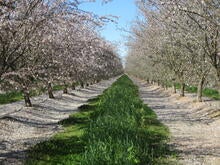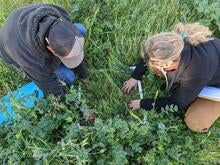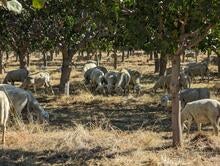Recruiting Postdoctoral Scholar
Cover Crops and Sheep Grazing for Pest Management in Organic Orchard Systems
Dr. Houston Wilson, Dept. Entomology, University of California - Riverside
Kearney Agricultural Research and Extension Center (near Fresno, CA)
Wilson Lab Website: http://treecrops.ucr.edu/
Location: Fresno, CA | Annual Salary: $64,480 - $77,327 | Apply By: 5/1/24
Submit Application via Email to: houston.wilson@ucr.edu
Position Description
The University of California, Riverside, Department of Entomology (http://entomology.ucr.edu/) invites applicants for a full-time postdoctoral scholar position to conduct applied research and extension under the mentorship of Dr. Houston Wilson (http://treecrops.ucr.edu/) at the UC Kearney Agricultural Research and Extension Center (https://kare.ucanr.edu/) in Parlier, CA.
This postdoctoral scholar will help lead an on-going project to evaluate the influence of cover crops and sheep grazing on pest control, soil quality and food safety in certified organic pistachio, almond and walnut orchards in California. This is a collaborative effort with Dr. Amelie Gaudin (Assoc. Professor, Dept. Plant Sciences, UC Davis; https://gaudin.ucdavis.edu/) and Dr. Alda Pires (Assoc. Cooperative Extension Specialist, School of Veterinary Medicine, UC Davis; https://www.vetmed.ucdavis.edu/faculty/alda-pires). Within this project, the postdoctoral scholar will be responsible for conducting research and extension focused on the impacts of cover crops and sheep grazing on control of navel orangeworm (Lepidoptera: Pyralidae: Amyelois transitella) (NOW), as well as help coordinate broader project activities. The ideal candidate would be knowledgeable in entomology with an interest in understanding broader outcomes of organic orchard systems, as well as have experience conducting applied research in collaboration with farmers. The position will be for a two-year residence with possible renewal up to five years, contingent on funding. The position will begin in the summer of 2024, or as soon as possible after that time. Salary ranges from $64,480 - $77,327 annually depending on experience.
Navel Orangeworm, Primary Pest of California Tree Nuts
Almonds, pistachios and walnuts are extensively planted and highly valuable crops in California, which is the leading agricultural state in the United States. There are currently just over 2 million acres of tree nut orchards in California, which generate an annual farm-gate value of approximately $9.3 billion. Within the larger California agricultural matrix, almonds, pistachios and walnuts currently account for approximately 17-18% of both total cultivated acreage and agricultural value generated in the state annually.
Navel orangeworm (NOW) is the primary pest of tree nuts. Adults oviposit onto the nuts and the larvae feed directly on the nut kernels. This not only reduces crop yield and quality, but NOW infestation has also been associated with the presence of the fungus Aspergillus flavus that can produce aflatoxin, a known human carcinogen that is heavily regulated in key markets. As such, tree nut growers have very little tolerance for NOW infestation and typically aim to keep infestation at <2%. NOW overwinter as larvae/pupae in remnant nuts that were not harvested. As such, removal and destruction of these remnant nuts (i.e. crop sanitation) is a primary component of NOW management, along with mating disruption, well-timed insecticide applications and timely harvest.
Multiple Benefits of Cover Crops and Sheep Grazing in Tree Nut Orchards
Recently, California growers have started to explore the use of winter cover crops and fall/spring sheep grazing to improve orchard sustainability. While the primary impetus for these practices is to improve soil quality, these practices may contribute to additional ecosystem services such as pest management and weed control. Previous studies by the Wilson Lab have documented increased overwintering mortality of NOW in the presence of cover crops (https://doi.org/10.1093/ee/nvac051), and a series of recent pilot studies demonstrated that sheep grazing can reduce the abundance of both remnant nuts and weedy biomass. While growers are excited to further develop the use of these practices in their orchards, there are also concerns about the food safety risks associated with animal integration. As such, this project will evaluate both the individual and combined impacts of different cover crops and sheep grazing regimes on soil quality, crop sanitation and weed control, as well as pathogen loads and persistence.
Postdoctoral Scholar - Roles and Responsibilities
The purpose of this postdoctoral scholar position is to help carry out field and greenhouse experiments associated with this effort to further develop the use of cover crops and grazing for crop sanitation and weed control in tree nut orchards. The final candidate will primarily help design, implement and analyze all experiments related to NOW and weed control, as well as support on-going outreach and extension efforts to communicate project findings to the California tree nut industry and scientific community at the regional, national and international level. Additionally, the postdoctoral scholar will also be responsible for working with growers/grazers to facilitate implementation of the on-farm experiments as well as coordinate field sampling of research sites across the collaborating lab groups (i.e. Wilson, Gaudin, Pires).
Location and Affiliation
While the postdoctoral scholar will be a member of Dr. Houston Wilson’s laboratory (http://treecrops.ucr.edu/), they will be expected to work collaboratively with all project PIs, which include Dr. Amelie Gaudin (Assoc. Professor, Dept. Plant Sciences, UC Davis; https://gaudin.ucdavis.edu/) and Dr. Alda Pires (Assoc. Cooperative Extension Specialist, School of Veterinary Medicine, UC Davis; https://www.vetmed.ucdavis.edu/faculty/alda-pires). Dr. Wilson's lab is based at the UC Kearney Agricultural Research and Extension Center (http://kare.ucanr.edu/) in Parlier, CA (map here).
Qualifications
Applicants should be recent recipients of a doctoral degree (or anticipated recipient in spring/summer 2024), with demonstrated interest and publication ability in agricultural entomology, ecology and/or insect biology, as well as a broader understanding of key elements of perennial crop production. They should be experts in statistical analysis of ecological and biological datasets (including generalized linear mixed-effects models with non-Gaussian distributions) in R and other appropriate software. While expertise in geographic information systems (GIS) is preferred, it is not necessarily required. The academic record must have demonstrated capacity to work independently and lead the development and publication of research results. Experience working with orchard or other crop production systems, prior coursework on agronomic details of crop production systems, and/or experience communicating with growers about technical details of their production systems is strongly preferred. Interest in soil health, food safety, organic agriculture, and/or cooperative extension is preferred but not required. The position is open with respect to academic discipline, and could include entomology, agroecology, biology or other appropriate natural science training.
Application Process
If you intend to apply, please notify Dr. Houston Wilson (houston.wilson@ucr.edu) as soon as possible, and send full applications electronically to houston.wilson@ucr.edu. Applications received by 5/1/24 will be given first consideration, although we will continue to accept applications after that date. Applications should include a CV, letter describing research interests and background as applied to this project, examples of any relevant publications, and contact information for three references. Top candidates will be interviewed by Zoom or phone with possibility of a visit to the lab. For more information about this position, please contact Dr. Houston Wilson, Assoc. Cooperative Extension Specialist, Department of Entomology, at houston.wilson@ucr.edu.
UC Riverside Notifications
UCR is a world-class research university with an exceptionally diverse undergraduate student body. Its mission is explicitly linked to providing routes to educational success for underrepresented and first-generation college students. A commitment to this mission is a preferred qualification.
The University of California is an Equal Opportunity/Affirmative Action Employer. All qualified applicants will receive consideration for employment without regard to race, color, religion, sex, sexual orientation, gender identity, national origin, age, disability, protected veteran status, or any other characteristic protected by law.
University of California COVID-19 Vaccination Program Policy: As a condition of employment, you will be required to comply with the University of California SARS-CoV-2 (COVID-19) Vaccination Program Policy. All Covered Individuals under the policy must provide proof of Full Vaccination or, if applicable, submit a request for Exception (based on Medical Exemption, Disability, and/or Religious Objection) or Deferral (based on pregnancy) no later than the applicable deadline. For new University of California employees, the applicable deadline is eight weeks after their first date of employment.


